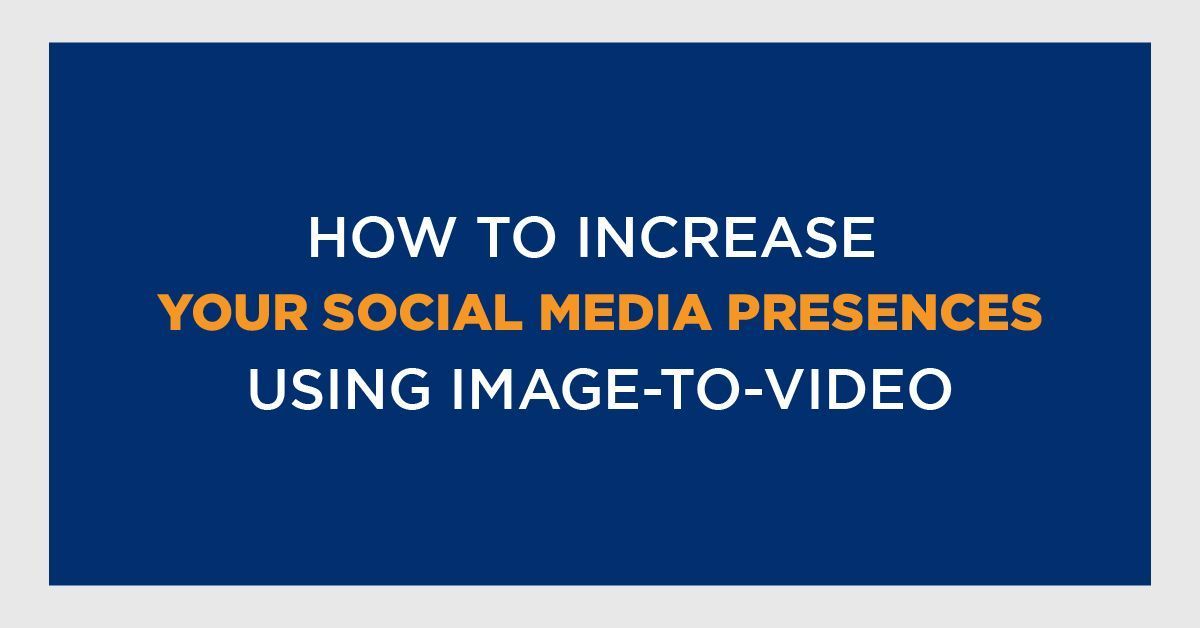How to Increase Your Social Media Presences Using Image-to-Video
July 12, 2024

How to Increase Your Social Media Presences Using Image-to-Video
Online communication now centers around social media sites. The way people interact with these platforms has changed dramatically with the rise of visual content. Posts with images and videos are much more engaging than those with only text, drawing readers in and holding their interest for longer.
Visual material is more successful at sharing information, telling tales, and evoking feelings. Making the most of visual content is crucial for companies and people who want to improve their social media presence.
Advantages of Video-to-Image Content
Image-to-video content, which combines the best aspects of both photos and videos, has become a popular and adaptable tool for social media interaction. Using this technique, producers may turn still photos into dynamic videos, giving their work a depth and interactivity that static images alone cannot provide.
Posts with image-to-video content are more engaging and shareable, which increases reach and engagement. Videos may make difficult concepts more memorable and concise, which increases the possibility that viewers will engage with the content.
Comprehending the Creation of Images to Videos
What exactly is image-to-video?
The term "image-to-video" describes the method of making videos out of a sequence of photographs. To create a coherent and captivating video narrative, this technique can involve the addition of transitions, music, text, and other elements.
Slideshow presentations, picture montages, and animated sequences that breathe life into still photos are a few examples of image-to-video content. This approach works especially well for sharing event highlights, narrating stories, and showcasing products in an eye-catching way.
Organizing the Content from Images to Videos
Determining Your Target and Objectives
It is essential to decide on your goals and comprehend your target audience before starting the development process. Are you trying to build community engagement, enhance website traffic, or raise brand awareness?
Your video's content and design will be determined by your goals. Furthermore, by knowing the tastes and habits of your audience, you may better customize your video to appeal to them and increase effectiveness and engagement.
Choosing the Correct Photos
A fundamental first step in producing engaging image-to-video content is selecting the appropriate images. Choose pertinent, high-quality photos that complement your brand and message.
By keeping a consistent color palette, style, and tone, you can ensure visual consistency. For your finished film to remain professional and clear, high-resolution photos are a must.
Making Storyboarding-Friendly Image-to-Video Content Your Clip
One of the most important steps in organizing the flow and order of your image-to-video material is storyboarding. To guarantee a coherent and captivating story, list the main ideas and organize your movie.
Choose the sequence in which to display the photographs and the locations for text, effects, and transitions. A carefully considered storyboard will expedite the production process and aid in keeping your goals front and Centre.
Including Voiceovers and Music
Your video's impact can be considerably increased by adding voiceovers and music. Choose background music that enhances the tone and meaning of your writing. Emotions can be evoked and your film more memorable with the correct music, whether it's dramatic, peaceful, or lively.
Content may be made more engaging and approachable by adding personality and context through voiceovers. Make sure the volume levels are balanced, and the audio quality is excellent.
Improving with Effects and Animations
Adding animations and effects to your photographs might help you produce a more dynamic and interesting film. Transitions ensure a seamless flow between various portions, while simple animations can breathe life into still images.
To draw attention to important issues without tiring out the audience, use effects wisely. Enhancing the visual appeal and keeping the audience interested are the two basic objectives of the video.
Enhancing Image-to-Video Content for Online Platforms
Tips Particular to Each Platform
For the best level of interaction, different social media platforms have different requirements and audience behaviors, necessitating customized strategies. On Instagram, for example, shorter, more visually arresting videos are preferred over longer, more in-depth content on Facebook.
Presentations that are polished and instructive are beneficial to LinkedIn's professional network, while Twitter's fast-paced atmosphere demands succinct, powerful videos. To optimize reach and engagement, customize your video's length, format, and content to suit the preferences of each platform.
SEO and Hashtags
For your videos to be seen, they must be optimized for social media and search engine algorithms. To boost searchability, include relevant keywords in the video's title, description, and tags.
Use trending and targeted hashtags to expand your audience and improve discoverability. To get more hits, make eye-catching custom thumbnails that accurately depict your content.
Planning and Publishing
When sharing videos on social media, timing is everything. Find out when posting on various platforms will yield the most visibility and interaction. To stay constant without tiring out your readers, use scheduling tools to organize and automate your postings. Analyse engagement numbers regularly to improve your posting schedule and determine the best times to reach your audience.
Assessing and Examining Output
Important KPIs to Monitor
Monitor important data like views, likes, comments, shares, and click-through rates to determine how successful your image-to-video content is.
While reach and impressions show how widely visible your video is, engagement analytics tell you how effectively your content connects with your audience. Finding effective strategies and areas for development is made possible by analyzing these metrics.
Examining Outcomes and Developing Improvements
To find out what works and what doesn't, review your video performance analytics on a regular basis. To obtain in-depth information and spot trends, use analytics tools.
Make data-driven changes to your strategy and content based on your results. To consistently improve your video marketing efforts, try out various formats, styles, and posting schedules.
Conclusion
Combining the benefits of both images and videos, image-to-video content is a potent approach to improve your social media presence. Through adherence to recommended procedures including strategizing, picking superior imagery, incorporating captivating soundtracks and narrations, and optimizing for various media formats, you may produce captivating films that effectively connect with viewers and encourage interaction.










